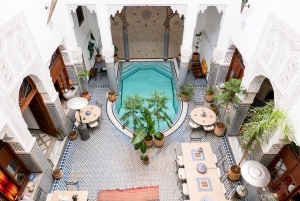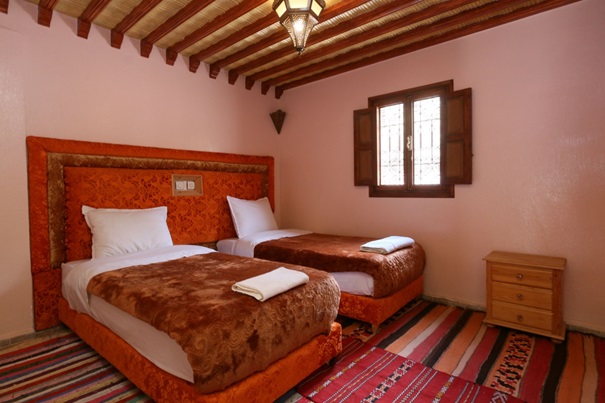Faqs
Why Morocco?
Morocco is built on tolerance. It is a melting pot of different faiths, traditions and cultures. It is often regarded as a country at a crossroad between Africa and Europe, Islam, Judaism and Christianity, modernity and tradition, pragmatic West and the exotic, romantic East.
Morocco is a land of contrasts .It has a distinct character all its own. You will see women wearing headscarves holding hands with their daughters, who are wearing skinny jeans. The complex intertwining geometries of the architecture in Fes and Marrakesh contrasts with the raw beauty of the crumbling Kasbahs in verdant Saharan oases. Morocco has something to offer for everyone.
Morocco is a captivating country and its people are welcoming and hospitable. Whether you wish to explore the medieval Medinas of the imperial cities, mix with the locals in the spice scented souks or take a safari to lavish oases or discover the hidden archeological treasures or go hiking in the mountains or the Sahara desert. Morocco of today will meet every visitor’s need.
Do I Need a Guide in Morocco?
You will need a personal guide during your trip in Morocco. Here are some of the reasons why you need a guide:
The medinas; old towns are made of a maze of narrow alleys and it’s very easy to get lost, or not to find the best parts. Even if you have a street map, you will find some towns very confusing to explore.
Official guides in Morocco are licensed with the Moroccan Ministry of Tourism and must pass through a rigorous course before they can qualify and be licensed which means that most official guides are unbelievably passionate about their country.
With your licensed guide will be safe and secure from the bogus guides and anyone who abuses tourists.
Your guide is local. He will share his personal knowledge about the country and local culture. This can include lodgings, food, itineraries and even transportation. This will also take the stress of handling these things off of you and allow you to more fully enjoy your trip
Your Tour guide will take you to stores that are worth your time and money. He will share with knowledge about the quality of items and negotiate the best deals for you and make sure that with your money you support people who work hard.
Your private Moroccan guide will consult you before planning anything to ensure that you get to see and do everything that you wish to.
Hiring a guide to take you to these places allows you to see and learn about sites tucked off the tourist trail.
Your tour guide can save you money while handling all of the trip’s logistics.
Is Morocco Safe?
Morocco is a safe and popular destination for international travelers. Though pickpockets can happen in bustling public areas like souks and beaches, violent crime is rare in Morocco.
Is it safe for a woman to travel alone?
Female travelers, especially those traveling alone, may experience unwanted attention from local men. Though this attention is more a nuisance than a danger, it’s best to avoid eye contact, ignore them or walk away briskly as you would anywhere in the world. When traveling around Morocco with a guide, female travelers are very rarely bothered.
Is it safe to drink the water in Morocco?
Though tap water is relatively safe, tourists should still drink bottled or boiled water and avoid drinking from public fountains. Brushing your teeth with tap water is usually okay.
Is it possible to drink wine, beer or alcohol here?
Although Islam forbids alcohol, it is available in most restaurants, bars and hotels classified with three or more stars. You can also buy wine, beer and spirits in liquor stores and most supermarkets except during the holy days of Ramadan.
How should I dress in Morocco?
In big cities, Morocco continues to be at a crossroad between traditional and modern culture, but still tolerant of foreign influence. You can relax and wear whatever is familiar and comfortable on the street at home. Morocco is very tolerant and welcoming to visitors; you're not expected to act or look like a Moroccan. Longer shorts and shirts are fine for men. For women it's a good idea to bring a scarf to cover bare shoulders and arms in rural villages. Shorts are not acceptable for women unless below knee length. Rural people will be visibly embarrassed if you choose to dress with skin showing, and react with a muffled laugh or cover their eyes.
How much will my trip cost?
At Moro Travel Morocco, we believe that everyone needs to travel and every traveler deserves to visit Morocco. In brief, we believe that you don’t need to be rich to travel to Morocco. In the past, many adventurous travelers with a small amount of money in their pockets have enjoyed their trips to the gateway of Africa: Morocco.
Just tell us your general budget and we will tailor a trip that fits your pocket and your interests.
We book rooms in varied kinds of accommodations at a range of standards. We can always book a room that fits your budget. However, the standards of our services are always VIP.
What’s a Medina?
The medina is the old part of a city, a labyrinth of narrow alleys enclosed within thick and high ramparts. Its main arteries are clogged with souks, workshops, ancient’s palaces and Moorish gardens and bustle with noise and energy while the quieter residential back streets provide the inhabitants with a sense of calm and safety. Every district of the medina has its hammam, bakery, market, school and main mosque.
What’s a Riad?
 The Riad is the traditional Moroccan house, normally multi-story around an Andalusian-style courtyard that contains a fountain. Riads were the stately city homes of the wealthiest citizens such as merchants and courtiers.
The Riad is the traditional Moroccan house, normally multi-story around an Andalusian-style courtyard that contains a fountain. Riads were the stately city homes of the wealthiest citizens such as merchants and courtiers.
The riads were inward focused, which allowed for family privacy and protection from the weather in Morocco. This inward focus was expressed with a centrally placed interior garden or courtyard, and the lack of large windows on the exterior walls of clay or mud brick. The design of this kind of building allows people to relax in the shadow especially during hot summer nights. The inside of a riad is quite chilly which makes it a perfect shelter from unbearable heat.
On the other hand, sun-lovers will also be satisfied as every riad has a rooftop terrace where you can sunbathe.
Entrance to these houses encourages reflection because all of the rooms open into the central atrium space. In the central garden of traditional riads there are often trees and often a fountain.
The walls of the riads are adorned with Tadelakt plaster and Zellige tiles. The style of these riads has changed over the years, but the basic form is still used in designs today. Recently there has been a surge in interest in this form of house with a wave of renovation in old Medinas, where many of these often-crumbling buildings have been restored to their former glory as hotels or restaurants.
What’s a gite?
 A gite is a specific type of holiday accommodation. A gite is a vacation home available for rent. A Gite d'Etape translates to 'staging post' and is a very basic Berber accommodation somewhat akin to a youth hostel in terms of relative 'luxury status'. It's a favorite type of accommodation, and a wonderful chance to experience the real Morocco. Gîtes are usually fully furnished and equipped for self-catering.
A gite is a specific type of holiday accommodation. A gite is a vacation home available for rent. A Gite d'Etape translates to 'staging post' and is a very basic Berber accommodation somewhat akin to a youth hostel in terms of relative 'luxury status'. It's a favorite type of accommodation, and a wonderful chance to experience the real Morocco. Gîtes are usually fully furnished and equipped for self-catering.
How much should I tip?
Tipping between 10% and 15% is customary. It’s recommended keeping on hands small bills and coins for attendants, servers, and taxi drivers. It is customary to tip guides about 100 Dirhams (~$9 US) per hour hired. If someone helps you find your way back to your hotel, expect to give him a tip of 10 DH (~$1 US). Generally speaking tip when deserved. Your tip is important and very much appreciated to support the local livelihood
Do you recommend purchasing travel insurance?
Yes, we recommend that you purchase travel insurance. Travel insurance is intended to cover medical expenses, lost luggage, flight changes and other losses incurred while traveling, either internationally or domestically.
Travel insurance can usually be arranged at the time of the booking of a trip to cover exactly the duration of that trip, or a “multi-trip" policy can cover an unlimited number of trips within a set time frame.
